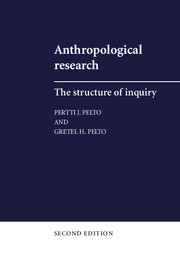Book contents
- Frontmatter
- Contents
- Preface to second edition
- Preface to first edition
- 1 The domain of methodology
- 2 Science and anthropology
- 3 Operationalism in anthropological research
- 4 Units of observation: emic and etic approaches
- 5 Tools of research – I
- 6 Tools of research – II: nonverbal techniques
- 7 Counting and sampling
- 8 Measurement, scales, and statistics
- 9 Art and science in field work
- 10 Research methods, relevance, and applied anthropology
- 11 Building anthropological theory: methods and models
- Appendixes
- Bibliography
- Index
7 - Counting and sampling
Published online by Cambridge University Press: 05 June 2012
- Frontmatter
- Contents
- Preface to second edition
- Preface to first edition
- 1 The domain of methodology
- 2 Science and anthropology
- 3 Operationalism in anthropological research
- 4 Units of observation: emic and etic approaches
- 5 Tools of research – I
- 6 Tools of research – II: nonverbal techniques
- 7 Counting and sampling
- 8 Measurement, scales, and statistics
- 9 Art and science in field work
- 10 Research methods, relevance, and applied anthropology
- 11 Building anthropological theory: methods and models
- Appendixes
- Bibliography
- Index
Summary
In earlier chapters, particularly in the discussion of operationalism, we noted the importance of “counting things” in field work and other anthropological research. Anthropological research reports always include statements that imply counting, even when quantification was not consciously and systematically carried out. Thus the typical monograph includes statements such as, “Most of the people participate in the festival”; “Very few of the people can avoid paying their taxes to the chief”; “They often work as much as ten to twelve hours a day”; “Very little in the way of news or other contact reaches the village from the outside world”; and so on.
The ubiquity of such quantitative statements in anthropological literature stems, perhaps, from basic processes of human psychological functioning. In fact, not only humans but also other animals are constantly counting things in the process of adapting to their environments. Basic processes of learning, as described by experimental psychologists, most often imply some kind of counting or measurement that permits an animal (human or other) to distinguish between one condition and another as a relevant stimulus for appropriate action. In the simplest experimental situation with animals, the subject (e.g., a rat or monkey) can quickly learn that pressing a bar rewards it with food, even when the reward does not occur every time the bar is pressed. The animal is able to make some approximation or estimate of the correlation between pressing the bar and the appearance of food.
- Type
- Chapter
- Information
- Anthropological ResearchThe Structure of Inquiry, pp. 123 - 140Publisher: Cambridge University PressPrint publication year: 1978

